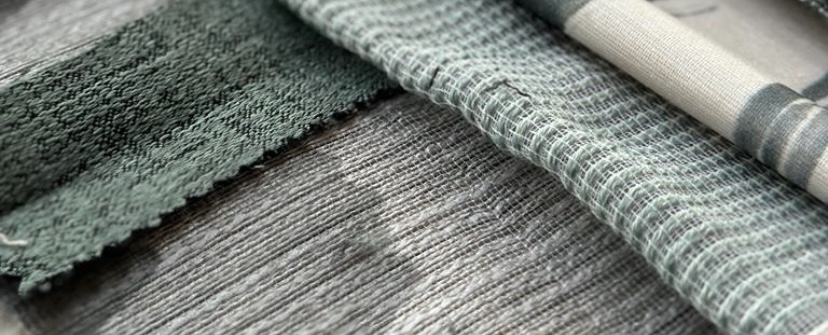
LEARNING OUTCOMES
After successfully completing this course, student is able to
- design a coordinated collection of surface patterns for further development and production in the advanced workshop courses.
- identify and apply commercial and industrial aspects of textile and collection design.
- display the skills and attitude to design, cooperate and communicate in a team, and recognise methods for managing, coordinating and directing creative team work.
Credits: 6
Schedule: 10.01.2023 - 23.02.2023
Teacher in charge (valid for whole curriculum period):
Teacher in charge (applies in this implementation): Maarit Salolainen, Hilda Niemelä, Hilkka-Maija Fagerlund
Contact information for the course (applies in this implementation):
For inquiries about the course, please email using your Aalto email address.
Content and general questions: Maarit Salolainen
Schedule, tasks and online content: Hilda Niemela
CEFR level (valid for whole curriculum period):
Language of instruction and studies (applies in this implementation):
Teaching language: English. Languages of study attainment: English
CONTENT, ASSESSMENT AND WORKLOAD
Content
valid for whole curriculum period:
The course consists of an individual design project, lectures, workshops, tutoring sessions, group work, and critiques. Students are familiarized with textile collection design methods and processes and challenged to position their work in the professional and commercial field. Visual collection concepts are developed in teams and set the base for designing the student's personal collection of surface desigs. Creative hands-on workshops introduce sketching techniques. Lectures on computer-assisted surface design and repeat-making support the design work. Lectures on commercial and creative textile collection design and free-lance work familiarize the students to commercial textile design. Students are guided to direct their own specialization and working media through combined advanced studio courses.
applies in this implementation
The course context is that of commercial textile design. Working in a design team is an important content of the course. The concepts and mood boards for the individual projects are developed in groups.
Assessment Methods and Criteria
valid for whole curriculum period:
The final grade for the course is based on student’s attendance and participation in the contact teaching as well as group work and the assignments that the students complete during the course. Students must attend and actively participate in at least 80% of the contact teachings. Introductory session is mandatory.
Workload
valid for whole curriculum period:
Overall workload (6cr): 162 h. Minimum 80% attendance in contact teaching is required.
- Contact teaching: 60 h
- Independent work: 71 h
- Personal reflection: 25 h
- Course evaluation 1 h
DETAILS
Study Material
valid for whole curriculum period:
Online material:
Guidebook to Surface Patterns MyCourses page
Course literature / course material:Salolainen, M. Interwoven - Exploring Materials and Structures. Aalto ARTS Books, 2022.
Additional literature:Thompson R, Manufacturing Processes for Textile and Fashion Design Professionals 1st Edition, 2014.Sinclair R,. Textiles and Fashion: Materials, Design and Technology, 2015.
applies in this implementation
Online material: Guidebook to Surface Patterns MyCourses page
Course literature:
Salolainen, M. Interwoven - Exploring Materials and Structures. Aalto ARTS Books, 2022
Additional literature:
Thompson R, Manufacturing Processes for Textile and Fashion Design Professionals 1st Edition. Sinclair R,. Textiles and Fashion: Materials, Design and Technology
Substitutes for Courses
valid for whole curriculum period:
Prerequisites
valid for whole curriculum period:
SDG: Sustainable Development Goals
12 Responsible Production and Consumption
FURTHER INFORMATION
Further Information
valid for whole curriculum period:
FaCT students: the course is to be combined with one or two Advanced workshop studio courses: MUO-E1065 Advanced Woven Fabrics and Jacquard Workshop, MUO-E1062 Advanced Knits and Knitwear Workshop, MUO-E1063 Advanced Printed Fabrics and Finishes workshop. The workshop selection should be based on the student's personal study plan approved by the academic advisor.
Teaching Language : English
Teaching Period : 2022-2023 Spring III
2023-2024 Spring IIIEnrollment :
Resgistration in Sisu. Min.10, max. 20 students. Priority order:
- Fashion, Clothing and Textile Design major (FaCT) students
- Exchange students in FaCT
- Textiles - Material and Structure Minor students.
Please note: Students who have completed their BA degree will be prioritized.
Priority order to courses is according to the order of priority decided by the Academic committee for School of Arts, Design and Architecture https://www.aalto.fi/en/services/registering-to-courses-and-the-order-of-priority-at-aalto-arts
applies in this implementation
The course is open only for students and exchange students from Fashion, Clothing and Textile Design major (FaCT) and Textiles - Material and Structure Minor students.
- FaCT students: MUO-E1066 Experimental Textile Design or MUO-E1068 Innovative Fashion Design course, knowledge of textile techniques and previous experience in the textile studios (basic studio courses), basic skills of Adobe Photoshop and Illustrator.
- FaCT Exchange students: knowledge of textile techniques and previous experience in the textile studios, basic skills of Adobe Photoshop and Illustrator.
- Textiles- Material and Structure Minor students: knowledge of textile techniques and previous experience in the Aalto textile workshops (min.2 basic studio courses), basic skills of Adobe Photoshop and Illustrator, basic skills of Adobe Photoshop and Illustrator.
Prerequisites:
Details on the schedule
applies in this implementation
The detailed schedule is published on the MyCourses Homepage.
